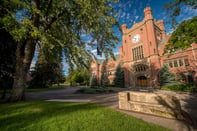Published on
Serving and Leading Through Controversy, Calamity and Chaos

Academic journals, webinar titles and popular media headlines over the last few years have commonly highlighted leaders who offer solutions to prevalent higher education challenges. I have been especially tuned into higher education leader and faculty perspectives about challenges activated by demographic, societal, economic and political shifts. As I observe controversy and catastrophe, I recognize the leadership opportunity for those who provide nontraditional educational offerings to adult learners.
How might our extended and professional education units add value?
I offer the words of philosopher Allan Bloom, John F. Kennedy and Martin Luther King, Jr.—all of whom give insight into the areas where we can create value. Each quote struck me as a clarion call for new dimensions of lifelong learning leadership and service.
Since our reach already extends beyond the campus, we can help foster enlightened, constructive dialog in a variety of settings among reflective critical thinkers. The first quote to support the call to this type of value creation is embedded in the preface of Professor Bloom’s 1987 bestselling The Closing of the American Mind: “The liberally educated person is one who is able to resist the easy and preferred answers, not because he is obstinate but because he knows others worthy of consideration.” In his 1962 Yale University commencement address, President Kennedy asserted, “Too often we hold fast to the clichés of our forebears. We subject all facts to a prefabricated set of interpretations. We enjoy the comfort of opinion without the discomfort of thought.” Looking back at an essay by Rev. Dr. King, I perceive an extended education core outcome to add value. Martin Luther King, Jr. penned in “The Purpose of Education” that “The function of education is to teach one to think intensively and to think critically. Intelligence plus character—that is the goal of true education.” Adult learners could realize these ideals if we embed the liberal arts into our continuing, professional and lifelong learning offerings. Accordingly, those with deep experience creating alternative learning pathways and public-private partnerships seem well positioned to engage adult learners with a suitable mix of liberal and professional education. Continuing and professional educators and higher education leaders can uniquely appeal to individuals in polarized communities to facilitate constructive dialog and personal development. However, I maintain that we co-design better transformative learning experiences with adult learners when our motivation is unconditional love.
Life can be hard and human interactions increasingly contentious. We can lead through chaos and calamity by serving all adult learners based on selfless love.
-Tonya B. Amankwatia
Even before SNHU President Paul LeBlanc challenged people to consider love when building intentional learning communities during his 2022 UPCEA keynote speech, I had been reflecting on the role of love. I offered love as one of the reasons for continued HBCU enrollment growth. For example, love is partly responsible for people overlooking the effects on systems and facilities due to long-term inequities and a lack of resources. Love helps educators and leaders draw out adult learners’ potential and aspirations during difficulties. However, we cannot draw out if we do not first draw diverse learners to us. That is where unconditional love comes into play. The etymology of the word education, educare,involves leading or drawing out. To change a mind, psychological safety should be built upon an underlying trust, caring, and empathy. To draw or lead out, adult learners must first be drawn to people and environments they trust. Extended learning and professional education units can be significant inclusive excellence partners for communities and businesses. I offer some suggestions for how we might serve and lead through controversy, calamity and chaos.
We spend a great deal of time and treasure on affordable, flexible program portfolios. Our communications about our programs are aided when messaging about communities and learners is consistent with inclusive excellence. We want to avoid signaling that some adult learners are not welcomed based on an unpopular but constitutionally protected viewpoint. For example, in times of declining enrollments and changing demographics, are educators comfortable decrying adults in certain states or with opposing beliefs as unworthy of personal development? It is primarily the learner’s journey. More adult learners might examine beliefs and assumptions to reject easy answers and clichés or test new ideas if we signal inclusion and unconditional love.
In addition, our instructional interactions and norms can prioritize empathy and active listening to draw people in. Empathy does not require a similar feeling or experience. Our value of the human potential for good to help form a more perfect union can be the impetus. The Citizens Campaign’s no-blame problem-solving course and citizen leadership book offer viable resources. Further, opportunities to expand our offerings and collaborations may exist within community engagement efforts throughout our institutions. During these collaborations, we can help lifelong learners with conflict resolution, empathetic listening and change leadership skills. We lead by promoting unbiased explorations of different worldviews.
Finally, embedding the liberal arts and human skills into our offerings and pedagogical designs should help us lead change. Designing instruction that includes reflection and metacognition is helpful. Our instruction should include opportunities for adult learners to hold up their human development mirror during activities designed for thinking about their thinking and reflecting upon their actions. The liberal arts typically focus individuals on the heart of the matter. Specifically, we can collaborate with our liberal arts colleagues to embed inquiry-based approaches that help learners answer their ethical, humanistic and philosophical questions. What is truth, evil and beauty? To what extent do I have unalienable rights? Who or what determines a person’s self-worth? What is my obligation to my community? Motivated by agape love, we would provide grace for people to learn from error and grow. We respect their journey to discover their answers while refraining from oversimplifying the difficult work of personal development and initiating uncomfortable conversations.
Life can be hard and human interactions increasingly contentious. We can lead through chaos and calamity by serving all adult learners based on selfless love. Inclusive communications, empathetic listening and embedded human skills and liberal arts should serve us well. What new offerings, outreach or partnerships might we initiate to advance unity in diversity on our campuses and in our communities? How ready is your institution to demonstrate authentic selfless love? I applaud my colleagues who already “do justice and love mercy” in ways that advance healthy communities, homes and people. I hope this inspires other servant leaders to join you in shining light in dark places, especially when it is difficult.
Author Perspective: Administrator



